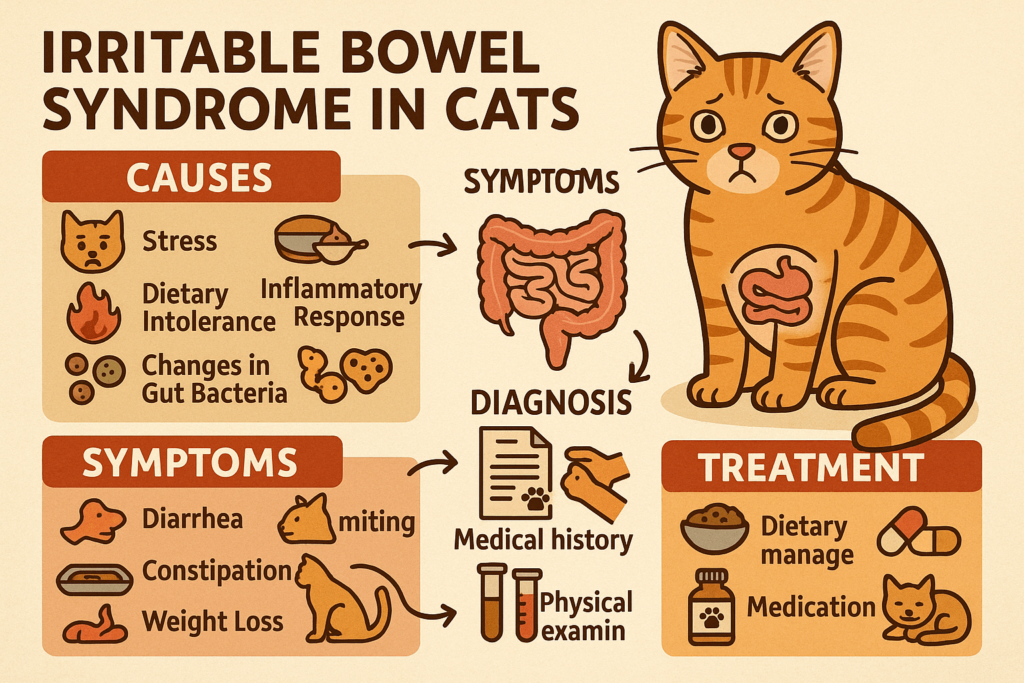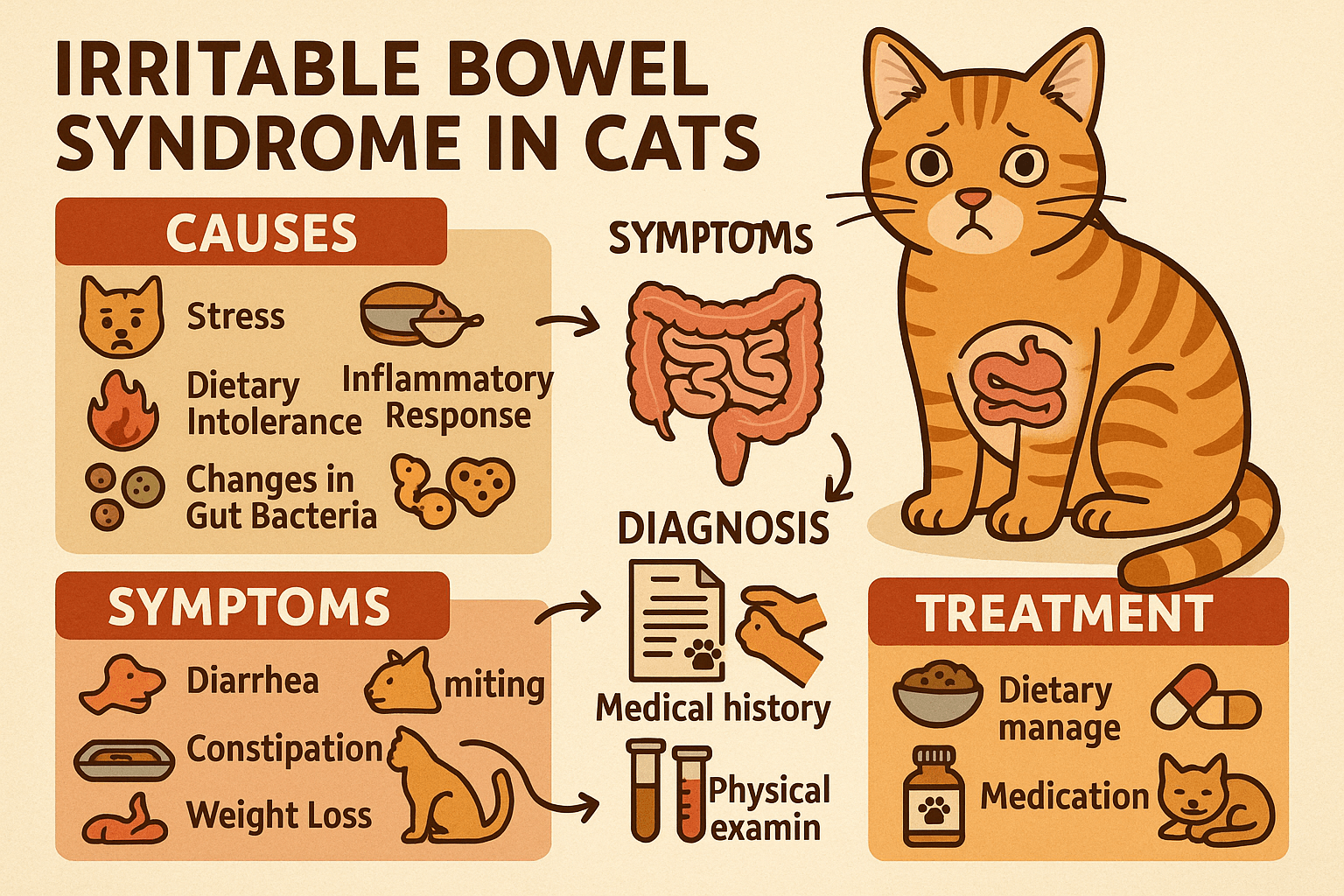Irritable Bowel Syndrome in Cats
Cats are known for their independent and mysterious nature, but when it comes to their health, they rely entirely on us. One condition that can significantly impact a cat’s quality of life is irritable bowel syndrome (IBS). While not as common as other gastrointestinal issues, IBS in cats can cause discomfort, stress, and even behavioral changes if left untreated. Understanding the symptoms, causes, and treatment options for feline IBS is essential for ensuring your furry friend stays healthy and happy. In this blog post, we’ll explore everything you need to know about managing and supporting a cat with irritable bowel syndrome.
Expert Insight on IBS vs. IBD in Cats
“While IBS in cats is severe and sudden inflammation of the gastrointestinal tract, IBD (inflammatory bowel disease) in cats is a syndrome characterized by chronic (long-term) inflammation of the mucosal lining of the intestinal tract.”
Signs and Symptoms of Irritable Bowel Syndrome in Cats
Recognizing the signs of irritable bowel syndrome in cats is crucial for early intervention. Since cats are masters at hiding illness, subtle changes in behavior or digestion may indicate an underlying issue. Here are some common symptoms to watch for:
Chronic Diarrhea:
Frequent loose stools are one of the most noticeable signs of IBS in cats. This symptom often occurs intermittently rather than constantly.Constipation:
Some cats with IBS may experience difficulty passing stool, alternating between diarrhea and constipation.Vomiting:
Occasional vomiting can be normal for cats, but persistent or frequent episodes may signal digestive distress.Weight Loss:
Unexplained weight loss is a red flag, especially if your cat has a reduced appetite or seems disinterested in food.Increased Grooming or Licking:
Cats with abdominal discomfort may excessively groom themselves or lick their bellies in an attempt to soothe pain.
If you notice any combination of these symptoms, it’s important to consult your veterinarian promptly to rule out other conditions and confirm a diagnosis.

Potential Causes of Irritable Bowel Syndrome in Cats
While the exact cause of irritable bowel syndrome in cats isn’t fully understood, several factors are believed to contribute to its development. Identifying potential triggers can help manage and prevent flare-ups.
Stress and Anxiety:
Cats are highly sensitive to changes in their environment, such as moving homes, new pets, or loud noises, which can exacerbate IBS symptoms.Dietary Sensitivities:
Certain ingredients in commercial cat food, such as artificial additives or low-quality proteins, may irritate the digestive system.Food Allergies:
Common allergens like beef, chicken, or dairy can trigger inflammation in the gut, worsening IBS symptoms.Parasites or Infections:
Intestinal parasites or bacterial infections can mimic IBS symptoms, making diagnosis challenging without veterinary testing.Underlying Health Conditions:
Diseases like pancreatitis, hyperthyroidism, or inflammatory bowel disease (IBD) may overlap with or worsen IBS symptoms.
Understanding these potential causes allows pet owners to take proactive steps in managing their cat’s condition effectively.
Check this guide 👉Understanding Cat Chronic Diarrhea: Best 7 Health Tips!
Check this guide 👉Diabetic Cat Vomiting: Best 7 Health Tips!
Check this guide 👉Understanding Cat Vomiting Blood: Best 7 Expert Tips!
Symptoms of IBS in Cats | Possible Causes of IBS in Cats |
|---|---|
Chronic diarrhea | Stress and anxiety |
Constipation | Dietary sensitivities |
Vomiting | Food allergies |
Weight loss | Parasites or infections |
Increased grooming or licking | Underlying health conditions |
Treatment Options for Managing Feline IBS
Treating irritable bowel syndrome in cats requires a multifaceted approach tailored to your pet’s specific needs. With proper care, many cats with IBS can live comfortably and symptom-free.
Veterinary Diagnosis:
A thorough examination, including blood tests, fecal analysis, and imaging, helps rule out other conditions and confirms IBS.Dietary Changes:
Switching to a hypoallergenic or easily digestible diet can reduce irritation and improve gut health. Wet food is often recommended for added hydration.Probiotics and Supplements:
Probiotics support healthy gut flora, while supplements like omega-3 fatty acids may reduce inflammation.Stress Reduction Techniques:
Creating a calm environment through routines, enrichment activities, and pheromone diffusers can minimize stress-related flare-ups.Medications:
In severe cases, veterinarians may prescribe anti-inflammatory drugs, antispasmodics, or medications to regulate bowel movements.
By combining these treatments, you can provide comprehensive care that addresses both the physical and emotional aspects of IBS in cats.
Tips for Supporting Your Cat’s Digestive Health
Preventing and managing irritable bowel syndrome starts with promoting overall digestive wellness. These tips can help keep your cat’s gut healthy and reduce the risk of flare-ups.
Provide High-Quality Food:
Choose premium cat foods free from artificial additives and fillers to minimize digestive irritation.Maintain a Consistent Routine:
Cats thrive on predictability, so feeding them at the same times each day can reduce stress and promote regular digestion.Monitor Portion Sizes:
Overfeeding can strain the digestive system, so ensure your cat receives appropriate portion sizes based on their age and activity level.Encourage Hydration:
Proper hydration supports digestion. Consider providing a water fountain to encourage drinking or adding water to wet food.Regular Veterinary Check-Ups:
Routine vet visits help catch early signs of digestive issues before they escalate into chronic problems.
By incorporating these practices into your cat’s daily life, you can foster long-term digestive health and minimize the impact of IBS.
Preventing IBS Flare-Ups
Preventing flare-ups is key to managing irritable bowel syndrome in cats. These strategies focus on reducing triggers and maintaining stability in your cat’s lifestyle.
Limit Sudden Changes:
Avoid abrupt changes in diet, environment, or routine, as these can upset your cat’s digestive system.Use Calming Products:
Pheromone sprays or diffusers can create a soothing atmosphere, reducing stress-related symptoms.Introduce New Foods Gradually:
When transitioning to a new diet, mix increasing amounts of the new food with the old over 7-10 days to avoid digestive upset.Minimize Exposure to Toxins:
Keep harmful substances like cleaning chemicals or plants toxic to cats out of reach to protect their digestive health.Provide Mental Stimulation:
Interactive toys and playtime can distract your cat from stressors and promote emotional well-being.
By focusing on prevention, you can reduce the frequency and severity of IBS flare-ups in your cat.
Common Misconceptions About Feline IBS
Misunderstandings about irritable bowel syndrome in cats can lead to confusion and ineffective treatment. Clearing up these misconceptions ensures better care for your pet.
Myth: IBS Only Affects Older Cats:
While older cats may be more prone to digestive issues, IBS can occur at any age.Myth: Vomiting Is Normal for Cats:
Occasional hairballs are normal, but frequent vomiting requires veterinary attention.Myth: Diet Doesn’t Matter:
Poor-quality diets can exacerbate IBS symptoms, making nutrition a critical factor in management.Myth: IBS Can Be Treated Without a Vet:
Self-diagnosing and treating can delay proper care; always consult a professional.Myth: Stress Isn’t a Real Cause:
Stress plays a significant role in triggering IBS symptoms and should not be overlooked.
Understanding the truth behind these myths helps ensure accurate diagnosis and treatment.
How to Create a Stress-Free Environment for Your Cat
Reducing stress is vital for managing irritable bowel syndrome in cats. A peaceful environment minimizes triggers and promotes overall well-being.
Designate Quiet Spaces:
Provide areas where your cat can retreat from noise or activity, such as a cozy corner with their bed.Stick to a Routine:
Cats feel secure with predictable schedules for feeding, playtime, and sleep.Use Calming Music:
Soft classical music or specially designed pet relaxation tracks can soothe anxious cats.Limit Visitor Interactions:
Too many unfamiliar faces can overwhelm your cat; introduce visitors gradually and supervise interactions.Provide Vertical Space:
Cat trees or shelves allow your cat to observe their surroundings from a safe height, reducing feelings of vulnerability.
A stress-free home environment can go a long way in managing IBS and improving your cat’s quality of life.
Frequently Asked Questions About Irritable Bowel Syndrome in Cats
What is the difference between IBS and IBD in cats?
IBS involves functional bowel issues without structural damage, while IBD includes chronic inflammation of the intestinal lining.
Can IBS in cats be cured?
While there’s no definitive cure, proper management can significantly reduce symptoms and improve quality of life.
How long does it take to see improvement with dietary changes?
It may take several weeks to notice improvements after switching to a new diet, as the digestive system needs time to adjust.
Are certain breeds more prone to IBS?
There’s no breed-specific predisposition, but cats with sensitive stomachs or high-stress personalities may be more susceptible.
Can stress alone cause IBS in cats?
Yes, stress is a major contributing factor, though it often interacts with other triggers like diet or underlying health conditions.
Empowering Your Cat’s Journey to Better Digestive Health
Managing irritable bowel syndrome in cats requires patience, observation, and collaboration with your veterinarian. By understanding the symptoms, addressing potential causes, and implementing effective treatments, you can help your feline companion lead a happier, healthier life. Remember, every cat is unique, so finding the right balance of care may take time. With love, dedication, and the right strategies, you can minimize the impact of IBS and strengthen the bond you share with your beloved pet.
Do Cats Have Taste Buds? Best 7 Expert Tips! – Discover how cats experience flavors and why their taste is so unique.
Do Dogs Have Taste Buds? Best 7 Expert Tips! – Discover how dogs experience taste, their preferences, and what it means for their diet and health.
Can Cats Taste Sweet? Best 7 Expert Tips! – Discover why cats can’t taste sweetness, how it affects their diet, and tips to keep them healthy and happy.
Can Dogs Taste Sweet? Best 7 Expert Tips! – Discover how dogs perceive sweetness, which foods are safe, and tips to manage their sweet cravings responsibly.





